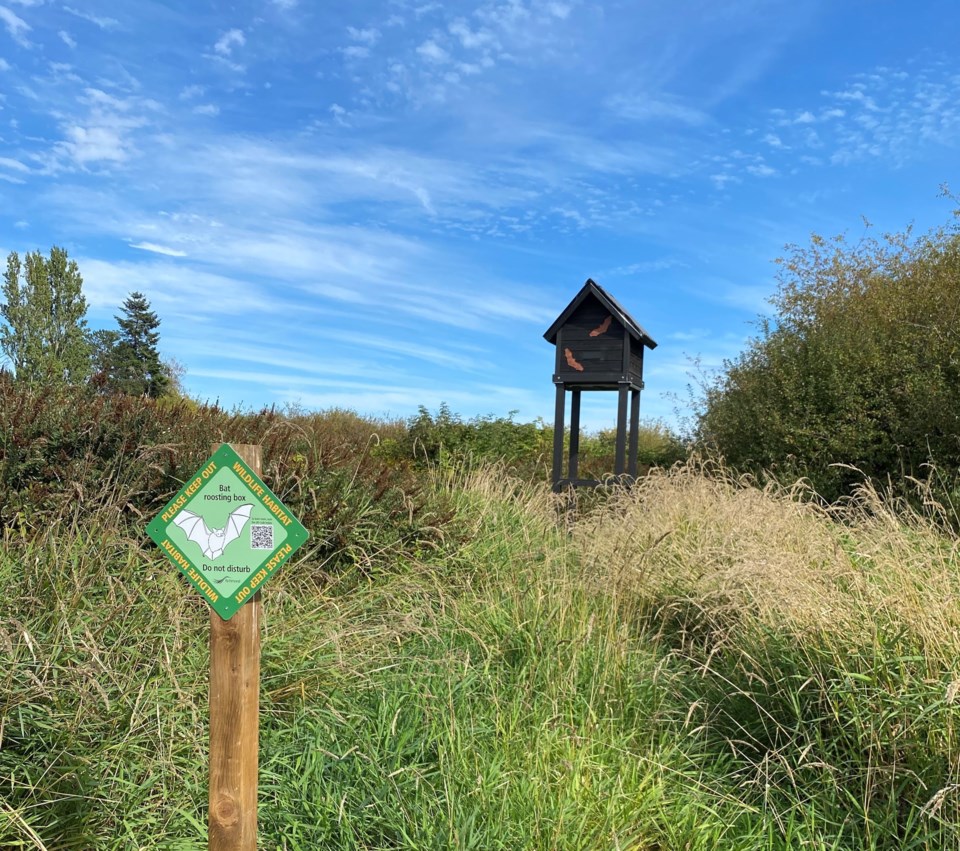In an undisclosed location in Terra Nova Rural Park sits a home that could house up to 3,000 bats.
It’s hoped that the “bat condo,” installed in the park by the City of Richmond last year, will become a maternity roost for female bats, where they could give birth to and raise their pups, said Chad Paulin, the city’s director of environment.
He said city staff have checked the condo each season, in line with the mating and roosting period, but so far there are no signs of inhabitation.
“We are considering maybe putting in something less intrusive…maybe a video camera, to kind of stay away from that area,” he said. “People can find it, but we’ve purposely kept the location non-public to promote it being very isolated.”
The city’s bat condo takes the form of a house-shaped structure on stilts. Bat boxes, according to the city, may be used from April to September and must be built using specific criteria, such as multiple chambers and chambers with internal connections, as well as an adequate landing pad.
Paulin said the city is also planning to install “satellite” bat condos – which would function as “rest stops” and create a connected network around Terra Nova, and hopefully encourage habitation in the area, if that’s not already occurring.
This week (Oct. 24 to 31) marks International Bat Week, which the city is also celebrating.
Paulin said it took some time to find the right location for the bat condo – purchased two years before it was installed – including acoustic testing (monitoring the bats’ squeaks or calls to identify their species) and evaluation.
He said six bat species were found in the Terra Nova area through that testing, including the little brown bat which is a threatened species.
Bats are “extremely vital,” Paulin said, such as for managing insect populations in Richmond, particularly around the West Dyke. He said it’s estimated some bats can eat up to 1,000 mosquitoes an hour.
The city is also collecting more information about bats and how they can be protected, Paulin said.
Richmond became the first Lower Mainland city – and the third in B.C. – to be designated a “bat-friendly community” in January 2020.
At the time, Danielle Dagenais, the Metro Vancouver-Squamish regional bat coordinator with the Community Bat Programs of B.C., explained the city received the certification after showing a commitment to managing and conserving the local bat population.
Paulin said many of the city’s policies benefit bats, for example, ecological management initiatives, restricting pesticides, urban forest management and protection of riparian areas.
Part of the city’s bat-friendly designation includes public education, such as through the Richmond Nature Park Society and taking part in International Bat Week.
Richmondites are being encouraged to visit the Richmond Nature Park this week to participate in a scavenger hunt and learn more about bats.
People are also asked to report any roost sites or if they spot any dead bats or bats behaving oddly – such as flying around in the day time – to BCbats.ca.
People can also contact the city if they want to take part in habitat programs, help with monitoring or learn more about the benefits of bats.



